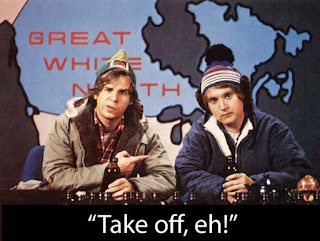 |
I can hear you cheering Aussie Aussie Aussie Oi Oi Oi!
For those that aren't familiar with that chant, pay close attention at the next Commonwealth Games or Olympics, or any sporting event for that matter, where Australia is competing. The cheer is usually accompanied by waving of the flag, the donning of green and yellow apparel, blow up kangaroos and fistfuls of beer.
There are quite a few other Australian sayings and phrases that can be baffling if you are new to the country. I've listed a few below (but trust me, there are many, many more!).
 |
You don't know whether you're Arthur or Martha
The phrase was first recorded in the 1940's, and means that you are confused - you don't know if you are coming or going.
Battler
A battler is someone who is doing it tough - 'battling' through life. Aussie's will often back the battler and cheer for the underdog. Which brings me to...
Tall Poppy Syndrome
Australian's, while cheering for someone who is struggling or fighting an uphill battle, also like to humble someone that thinks they are better than everyone else. People of high status (tall poppies) are often resented and cut down to size. The phrase can be found in use in Australia as early as 1864 in reference to someone that was awarded a knighthood. |
Bludger
Originally bludger was British slang for a prostitute's pimp and was found in use in Australia in the 1880's. It was defined at that time as 'plunderers in company with prostitutes' and 'a thief who will use his bludgeon and lives on the gains of immoral women.' Today it's meaning is still mostly the same, meaning someone that lives off the efforts of others, as in 'dole bludger' - someone who doesn't work and lives off the government. |
| Eric Bana played a bogan in his early acting days |
Bogan
This is a very common word here in Australia. Bogan is meant to be slightly derogatory, but now is often used as a badge of honour. It's basic meaning is an uncultured and unsophisticated person, someone who is uncouth. As far as words go, bogan is a recent addition to the vocabulary of Australians and became widespread in use in the 1980's. |
| The good kind of budgie smugglers |
Budgie Smugglers
A descriptive phrase for tight-fitting male swimwear that leaves little to the imagination (also known as dicktogs). The term was first recorded in the 1990's and is thought to derive from the English phrase - grape smugglers. As with most Australia words and phrases, it is often shortened to 'budgies' as in "Look at the bogan strutting about in his budgies."
Cobber
Cobber means friend or companion. There is some debate regarding its derivation, some believe it is from the Yiddish word 'chaber' (comrade) while other believe that it originated from the British word 'cob' (to take a liking to someone). Nevertheless, it has been in use since at least the 1890's, although is not as popular today as 'mate'. |
Cooee
This was originally a call by an Aboriginal person to communicate with another person some distance away. It derives from the Aboriginal word 'gawi' or 'guwi' and means 'come here'. Today it is still widely used as a signal in the bush. If someone is 'within cooee' they are within earshot.
Dinkum or Fair Dinkum
If something is dinkum, it is reliable, honest and true. Fair dinkum means fair dealing that is just and equitable. The phrase was recorded in Lincolnshire in 1881 and first recorded in Australia in the 1890's.
 |
Drop Bear
A native (imaginary) animal that has extremely sharp teeth. While it resembles a koala, it loves to devour tourists after dropping onto them from trees. Some believe that the term originated during the Second World War, but the first record of its use was in the 1980's.Part 2 next Friday.....















































